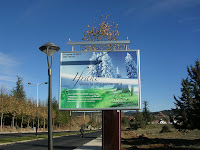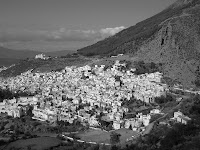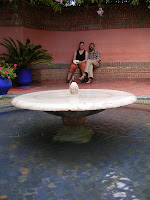
 One final Morocco posting: we have made the journey from Ifrane back to lovely Portland, Oregon! The trip was pretty uneventful ... we took off from Casablanca at 1:30 a.m. Sunday morning (Moroccan time) had a four hour layover in Frankfurt where we partook of our first swine in quite a while, then it was a direct 10 1/2 hour flight to Portland. Rachel and Ryan met us at the airport and helped lug our plethora of bags (thanks SO much guys!): two large backpacks, two small carry-on backpacks, two medium roller bags, one large rolling garment bag, my guitar, a cloth bag with my laptop and a plastic bag with some miscellaneous stuff purchased in Morocco!! We had to pay to check an extra bag in Casablanca and carried a couple of extra things on the plane - no one stopped us, so I assume it wasn't a big deal. Once reunited with part of our Portland posse, the four of us immediately proceeded to La Bonita for some burritos (YUM!) and to a coffee shop next door for some Stumptown (double YUM!!) and conversation. We are now chilling at Rachel's new, incredibly cute house in North Portland and trying to figure what happens from here.
One final Morocco posting: we have made the journey from Ifrane back to lovely Portland, Oregon! The trip was pretty uneventful ... we took off from Casablanca at 1:30 a.m. Sunday morning (Moroccan time) had a four hour layover in Frankfurt where we partook of our first swine in quite a while, then it was a direct 10 1/2 hour flight to Portland. Rachel and Ryan met us at the airport and helped lug our plethora of bags (thanks SO much guys!): two large backpacks, two small carry-on backpacks, two medium roller bags, one large rolling garment bag, my guitar, a cloth bag with my laptop and a plastic bag with some miscellaneous stuff purchased in Morocco!! We had to pay to check an extra bag in Casablanca and carried a couple of extra things on the plane - no one stopped us, so I assume it wasn't a big deal. Once reunited with part of our Portland posse, the four of us immediately proceeded to La Bonita for some burritos (YUM!) and to a coffee shop next door for some Stumptown (double YUM!!) and conversation. We are now chilling at Rachel's new, incredibly cute house in North Portland and trying to figure what happens from here. (The weather here is slightly cooler and slightly wetter) --------------->
(The weather here is slightly cooler and slightly wetter) ---------------> To rewind just a bit: the last week in Ifrane was very nice - the weather was really warm, and we had a few dinners with people to sort of say goodbye. Thursday and Friday nights we had people over and got rid of a bunch of the stuff we had acquired over our stay. Unfortunately, the tagine wouldn't fit into our luggage, and I'm guessing if we HAD fit it, it would have been powder by the time we got home, so we gifted it to Katie. I couldn't part with the stove top espresso maker and managed to jam it into the top of my backpack. I had an excellent latte yesterday that would not have been possible if I had left this beautiful device behind.
The travel day prior to our flight was actually really cool. We have a tendency to be rushing around on big days like this, but amazingly that didn't happen this time around. Our packing was pretty much done Friday night. We hired a van from AUI to take the two of us, plus Katie, Misty and two other people (Carla and Katie II) to a hotel in Casablanca at noon on Saturday. This gave us plenty of time in the morning to shower, do some final packing and eat a good breakfast before setting out. The van ride was a little vomitous, as are most automobile rides in Morocco, but we made it in one piece to Casa and it was great to have some time to chat. We reached the Hotel Ibis in Casa (where Katie and Misty were staying for a night or two before their flights) at about 5:30 p.m. and essentially had 6 hours to hang out. There was a little bit of bullshit about putting our bags in their room ... I think the management was concerned about the morality of one man going to a room with four women. This was a really classy joint, you see. We managed to work around it, though the folks were none too friendly.
Our six hours in Casa were spent chilling with coffees on the Ibis patio, visiting the giant Hassan II Mosque (second largest in the world), and grabbing some delicious Italian food. I didn't bring the camera to the mosque since it was back in the room and management didn't want me to go, but Misty and Carla took some pictures, so hopefully I can get ahold of them soon and put them up for y'all. It really was an amazing thing to see and pictures probably won't do it much justice. We had all visited MANY mosques in Morocco and were surprised at how friggin cool this thing was. It's situated right on the ocean. There are only special hours when non-Muslims can enter, so we didn't get to go in, but apparently a portion of the prayer room has a glass floor where you can look over the rocks and waves below. The minaret is gigantic, with brilliant zellij mosaic at the top (and supposedly a laser pointed toward Mecca, though we couldn't see it). Leading up to the mosque is a wide open plaza with carved arches along the sides. As we walked up, the call to prayer was announced over the speaker - it was very loud and pretty surreal to hear it echo all around us. Once up to the mosque, the artistry was utterly amazing. Some 6000 local artisans worked on the wood, marble, steel and zellij found around the structure. The doors into the mosque were made of steel and had to have been around 60 feet tall! Hopefully some pictures will be available soon for you ... here's one I found on the net: Hassan II Mosque.
Goodbyes were a little sad, though at least we'd had quite a bit of time to hang out over the day. They were hurried a bit by the process of getting a grand taxi to take us the half hour to the airport outside of Casa. The minute we stepped out of the hotel with our baggage, a grand taxi driver approached and said his price and porters appeared from nowhere and bags were being grabbed and loaded and no, we would need two grand taxis since we had so much luggage and it would be dangerous (HAH, you gave yourself away grand taxi driver ... you learned the word "dangerous" from tourists) and Carla just kept saying no, we're only taking one taxi and kept cramming stuff in the car then Sam wedged herself in the back seat and we had to force the door closed and Carla and I sat nearly on top of each other in the front seat and oh yeah, bye Misty and Katie, and we were careening away from the hotel. But, we got to the airport early enough to deal with stuff and only had one worrisome moment at the gate when agitated passengers three gates down started pounding on the walls and yelling and pulled the fire alarm. We had our final kahwa nous-nous (half espresso, half milk) from the Casablanca airport cafe, and damnit, I forgot to take a picture.
Pictures: Goodbye Ifrane!





























